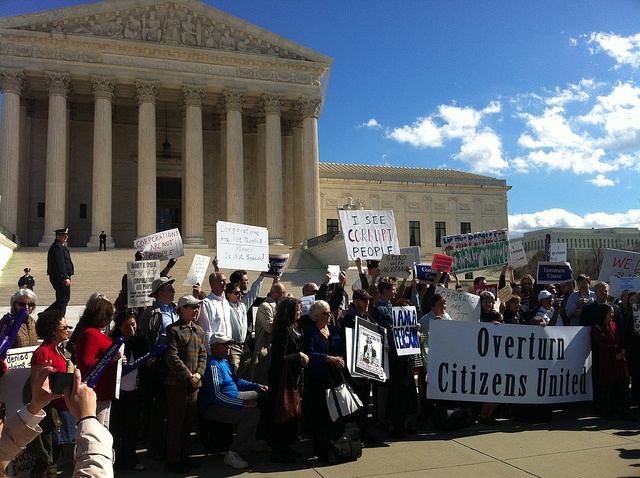As Citizens United turns six, the movement to end 'legalized corruption' gains momentum

A growing grassroots movement aims to curb the massive influx of political spending as a result of the Supreme Court's 2010 Citizens United decision. (Photo of a 2012 protest outside the Court by Jordan Krueger.)
Six years ago this week, the U.S. Supreme Court issued its decision in Citizens United v. Federal Election Commission, allowing unfettered political spending by corporations and unions.
As a result of that ruling and subsequent lower court decisions, corporations and unions as well as individuals can spend unlimited sums to both directly and indirectly advocate for the election or defeat of candidates for office via super PACs, which are required to disclose their donors, or "social welfare" and other nonprofit organizations, which are not.
These political expenditures, often funded by wealthy, mostly white donors, come in the form of television ads, radio spots, phone calls, and direct mail — an onslaught of political advertising that sometimes begins months before an election.
In the 2012 election cycle, the second since Citizens United, super PACs alone received nearly 10 times the amount of money they had two years earlier, raking in $828 million, according to the Center for Responsive Politics. In 2014, super PACs received $696 million in contributions, an eight-fold increase from the previous midterms. And now, at the beginning of a presidential election year, super PACs have already taken in $322 million. Meanwhile, secret-money groups — including 501c4 "social welfare" nonprofits, 501c5 labor organizations, and 501c6 trade associations — have spent over $600 million since 2010.
These outside spending groups that are unaffiliated with campaigns or parties have already combined to spend $154 million on federal races during this election cycle, putting them on track to shatter previous spending records. At this point in the 2012 cycle, such groups had only spent one-quarter of that amount.
Citizens United has also altered the political landscape at the state level, with Republicans and corporations benefitting. According to a study of the 2010 and 2012 state elections, Republican-oriented super PACs raised approximately 50 percent more money than their Democratic-leaning equivalents, and they spent roughly twice as much. Businesses ramped up their donations to such groups far more than did labor groups, largely to the benefit of GOP candidates. North Carolina saw spending on state House and Senate races more than triple from 2010 to 2014.
More spending typically increases the odds that a candidate will win, observes elections law expert and University of California at Berkeley professor Rick Hasen, who has a new book out this week titled "Plutocrats United." The United States, he writes, is "hurtling ... toward a plutocracy in which the people with the greatest economic power can wield great political power through campaign donations and lobbying."
The biggest donors often get their payback in the form of favorable policies, tax codes, and government contracts when the candidate they supported takes office — what Fred Wertheimer of the Democracy 21 campaign-finance reform group calls "legalized corruption."
But government officials and citizen activists are working to stem the rising tide of money in politics.
As a result of years of pressure from good-government groups, President Obama is considering an executive action requiring federal contractors to disclose their donations to political spending groups. Besides increasing transparency, a policy of mandatory full disclosure also has the potential to decrease donations.
On the state and local level, citizens are fighting big money with a diverse set of tactics. They include pressing for a constitutional amendment to overturn Citizens United. To date, 16 states and close to 700 cities and towns have endorsed such an amendment.
Campaign finance reformer and author Derek Cressman thinks that reversing Citizens United is possible. Since much of the public is aware of the problem of big money in politics — and 85 percent think our campaign finance system needs either fundamental change or a complete overhaul — citizens can turn the tables with approaches such as influencing the next Supreme Court justice confirmation process, a convention of the states, and mass nonviolent protests.
"Citizens must accept that there will be continual threats to our democratic republic," says Cressman, "but with diligence and commitment we can make things better."
Tags
Alex Kotch
Alex is an investigative journalist based in Brooklyn, New York, and a reporter for the money-in-politics website Sludge. He was on staff at the Institute for Southern Studies from 2014 to 2016. Additional stories of Alex's have appeared in the International Business Times, The Nation and Vice.com.
